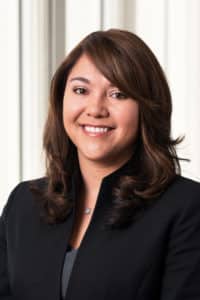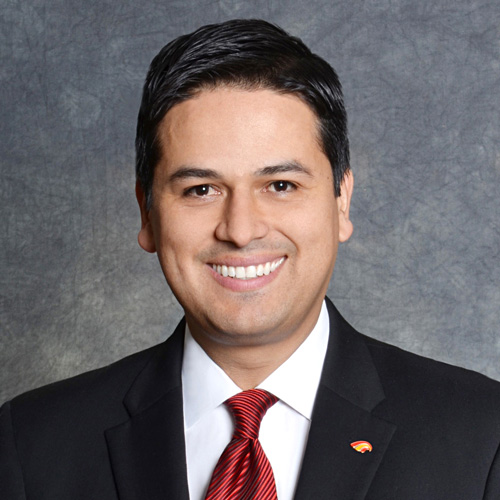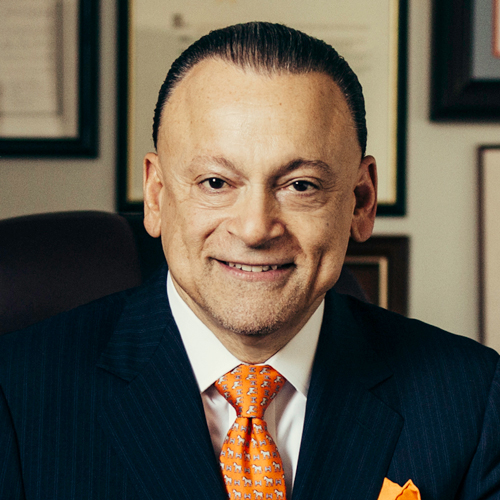
Exactly three aspects of Angelica Espinosa’s workday are the same every day. The vice president of compliance and governance and corporate secretary for Sempra Energy begins her day with a to-do list of ten to fifteen items, a review of her schedule, and a meeting with a member of her team.
“Of course, there is no typical day,” Espinosa says.
If she’s lucky, she says, she’ll be able to cross off at least one item that she started with. Her tasks and priorities can shift dramatically before the day’s end.
Thankfully, Espinosa is an expert at thriving in challenging environments. She was the first girl born into a large Colombian family.
“I spent my childhood proving to myself and to my family that I was as good or better than the twelve male cousins that I grew up with,” Espinosa says. “I never felt like I was different or less-capable.”
In Colombia, it’s typical for a child to attend the same school throughout their scholastic career, from age four to eighteen. After graduating, Espinosa attended la Universidad de Los Andes in Bogotá, where she would earn her first law degree.
At age eighteen, Espinosa’s entry into the legal world was an internship with a Colombian law firm that had several multinational and energy companies as clients. “I was hooked,” she says. After that internship, she focused on energy and international law, she says. Energy is also in her blood, Espinosa explains; her father is a petroleum engineer.
She later went to the United States to study law at Southern Methodist University (SMU) in Texas, as well as earn her master’s degree and graduate with a JD cum laude from Southern Methodist. After graduating from SMU law school, she worked at an international law firm in Texas that focused on energy. Shortly after, she worked at King and Spalding LLC, where she was able to use her language skills and focus on Latin American mergers and acquisitions.
She found an opportunity with General Electric (GE) in 2007, first as the regional counsel for Latin America, and then as chief counsel for all commercial transactions for the oil and gas business unit, leading a global team of twenty lawyers.
“There was no infrastructure,” Espinosa says of the role in Latin America. “LatAm was a small region when I joined, but had a lot of growth opportunities.” Espinosa was able to set up the processes needed to operate in these countries.
During her tenure with GE, Espinosa moved from peer to manager, and started to work in countries and environments that were not familiar to her. That was a very tough role, she recalls, where flexibility in negotiation styles, leadership styles, and management styles was required—after all, Espinosa and her team were supporting sales in more than one hundred countries. She learned how to be strategic, develop legal skills in areas other than energy and commercial, and how to work with the CEO and CFO of her division. She rose to the challenge, and Sempra Energy noticed. Sempra cold-called her.
Espinosa began at Sempra in 2014 as chief counsel and oversaw the company’s legal affairs for the company’s international businesses. In November 2016, she was promoted to vice president of compliance and governance and corporate secretary. In her current role, she manages relationships with major companies, like Sempra’s utility peers and its shareholders, and the relationships with the independent board members of Sempra. She is also responsible for the compliance department, which manages several programs such as anti-bribery and corruption and is integrated with the regulatory requirements present at utilities and energy companies.
Espinosa says she is proudest of the upgrade she gave to the compliance metrics in Sempra. Tasks that took fourteen days now take between twenty-four and forty-eight hours. Espinosa says this brought the company the information it needs to make decisions nearly in real time.
Information in the world of compliance is key, Espinosa says. She says she hopes to keep a focus on the big picture for Sempra and continue to further the company’s culture of compliance.
Another important aspect of her role at Sempra is making sure that her entire team has the legal skills necessary for the level of growth Sempra is experiencing. Luckily, Espinosa built a passion and skill set for talent development and inclusion earlier in her career. “GE is great at developing its talent,” she says.
Developing talent is important for many reasons. “You don’t want to be totally indispensable,” Espinosa says. “If no one can replace you, your opportunities may be limited and you won’t be able to advance upwardly.”
“Without innovation, talented people, and diversity, you’re not going to make progress as a business,” she says. Espinosa adds that businesses owe it to themselves and their employees to develop their “soft skills” through mentorships and other opportunities, because business requires clear communication and navigating multiple layers in companies and functions.
The key is learning and improving, Espinosa says. And that philosophy helps her tackle that ever-evolving to-do list.

